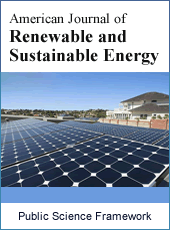American Journal of Renewable and Sustainable Energy
Articles Information
American Journal of Renewable and Sustainable Energy, Vol.1, No.3, Sep. 2015, Pub. Date: Jul. 23, 2015
Legal Recommendations for Developing Policies for Carrying Out Scientific Research Within Non-Governmental Organizations (NGO)s
Pages: 102-105 Views: 4681 Downloads: 1434
[01]
Renee A. Pistone, Legal Studies Department, Wilmington University, New Castle, DE, USA.
Background: The purpose of this research is to help to develop standardized procedures that comport with ethics and legal rules that must be followed throughout the entire research process. Aim: Also, it is important for scientists to consider certain ethical questions about what motivates researchers to conduct research and why certain projects get funded. Methods: To review the use of the scientific approach to a study. Results: Therefore, when we follow legal rules and consider the role of ethics within science, abuses in the ways research is undertaken, can be curtailed. This article explores the ways that scientists and researchers can check themselves to make sure they are in compliance with: ethical, scientific, and legal rules for carrying out funded research.
Ethics, Legal Rules, Policies
[01]
Poggi, F., Firmino, A., & Amado, M. (2015). Moving Forward on Sustainable Energy Transitions: The Smart Rural Model. European Journal of Sustainable Development 4: 43-50.
[02]
S. Keane, (2006). “The Case Against Blanket First Amendment Protection of Scientific Research: Articulating a More Limited Scope of Protection,” Stanford Law Review, 59.
[03]
M. Ivory, (2003). “Higher Education in the Twenty-First Century: The Social Context of Applied Science,” American Academy of Political Science Journal, 154.
[04]
Brandoni, C., & Polonara, F. (2012). The role of municipal energy planning in the regional energy-planning process. Energy, 48 (1): 323-338.
[05]
I. Chalmers, (2003). “Misleading Evidence and Evidence-Led Policy: Making Social Science More Experimental Why Experiments Matter, Trying to Do More Good than Harm in Policy and Practice: The Role of Rigorous, Transparent, Up-to-Date Evaluations,” American Academy of Political Science Journal, 22.
[06]
D. Shuman, (1998). “The Admissibility of Expert Testimony Based Upon Clinical Judgment and Scientific Research,” Public Policy Law Journal, 4.
[07]
J. Austin, (1999). Zen and the Brain. Massachusetts: MIT Press.
[08]
L. Eaves, (1989). Genes, Culture, and Personality. New York, Academic Press.
[09]
S. Blackmore, (2000). The Meme Machine. London: Oxford University Press.
[10]
Eicker, U., & Klein, M. (2012). Large-scale renewable energy integration within energy-efficient urban areas: results from three German case studies. International Journal of Low-Carbon Technologies, 2, 1-12.

ISSN Print: 2381-7437
ISSN Online: 2381-7445
Current Issue:
Vol. 4, Issue 4, December Submit a Manuscript Join Editorial Board Join Reviewer Team
ISSN Online: 2381-7445
Current Issue:
Vol. 4, Issue 4, December Submit a Manuscript Join Editorial Board Join Reviewer Team
| About This Journal |
| All Issues |
| Open Access |
| Indexing |
| Payment Information |
| Author Guidelines |
| Review Process |
| Publication Ethics |
| Editorial Board |
| Peer Reviewers |


